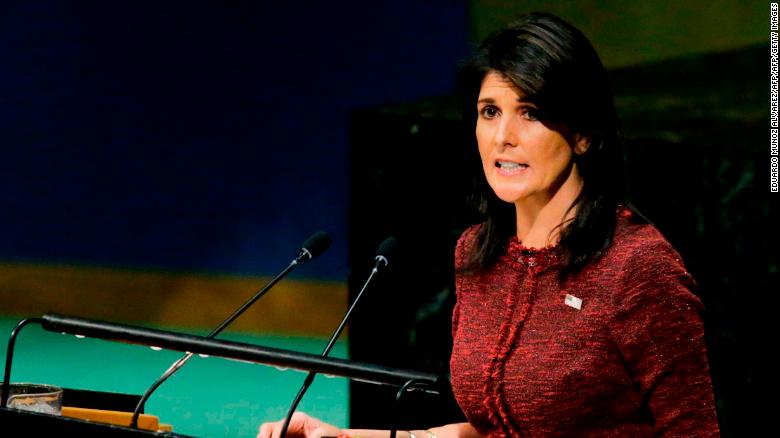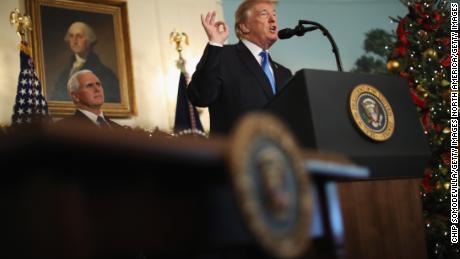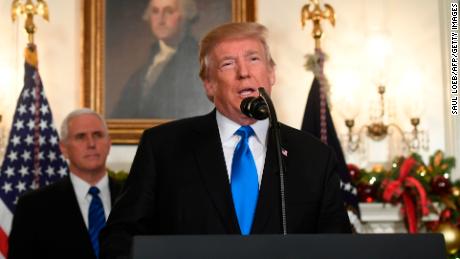(CNN)The US faces an embarrassing loss in the United Nations General Assembly Thursday despite comments by President Donald Trump suggesting countries that vote against the US could face repercussions.
Egypt called for a vote at the UN General Assembly after the US vetoed a resolution put to the Security Council rejecting Washington's decision to recognize Jerusalem and relocate its embassy there. The US cannot veto General Assembly motions, which require a simple majority to be adopted.
"We're watching those votes," Trump said Wednesday.
"Let them vote against us, we'll save a lot. We don't care. But this isn't like it used to be where they could vote against you and then you pay them hundreds of millions of dollars and nobody knows what they're doing."
US ambassador to the UN Nikki Haley also attempted to put pressure on other countries not to vote against Washington, vowing to "take names."
But how realistic is this threat? And which governments are most vulnerable to US economic pressure?
Massive military aid budget
Ironically, one of the most vulnerable to US financial pressure is also the least likely to go against Washington in Thursday's UN vote: Israel.
In 2016, Israel received $3.1 billion in military funding from the US, according to the United States Agency for International Development (USAID). Only Afghanistan and Iraq, where the US has been involved militarily since 2001 and 2003 respectively, received more money from the US Department of Defense (DOD).
The fourth biggest recipient of military funding however, is far more sensitive. Egypt received $1.1 billion from the DOD's Foreign Military Financing program and it's Cairo which is leading the push at the UN to condemn Trump's Jerusalem decision.
US funding has made up around 20-25% of Egypt's total military budget in recent years, according to statistics from the International Institute for Strategic Studies. No other country gives a comparable amount in military assistance to Cairo.
While that spending might make both a good carrot and stick, a chunk of it was already suspended over human rights concerns. There were reported plans to resume it next year, but Trump could very well reverse that.
Any long term cutting off of aid to Egypt's military -- which has run the country since a coup in 2013 -- is unlikely. US spending in Egypt ramped up after Cairo signed a peace treaty with Israel in 1979, and the country remains vital to US security interests in the wider region.
Overseas development assistance
Military spending may be the biggest cudgel Washington has to bring to bear, but it's also the least likely to be cut.
Most countries that receive significant military assistance from the US do so because they are key to American security interests -- like Iraq, Ukraine or Pakistan.
Overseas development assistance, such as that provided by USAID, is a more likely target for cuts -- though reductions would still have a knock on effect on US businesses and citizens who rely on projects funded by donor programs.
Trump has long been a skeptic of foreign aid, claiming the US is being taken advantage of. Since coming to power he has pledged to cut US overseas assistance, which at $43 billion previously only made up around 1 to 2% of the federal budget, or almost 10% of what has been spent on the F-35 Joint Strike Fighter program.
Of the top 10 recipients of USAID money in 2016, many were African nations, including Ethiopia, South Sudan, Kenya, Nigeria and the Democratic Republic of the Congo (DRC). Unlike Middle Eastern nations, which will face strong pressure internally to condemn the US Jerusalem move, these countries are also potentially less invested in supporting the Palestinians.
However, unlike in the Middle East and North Africa, where US assistance, particularly militarily, makes up a large portion of the total, African nations also receive significant funding from other sources.
According to the Organization for Economic Cooperation and Development (OECD), which tracks global aid spending, between 2014-2015, Ethiopia received some $700 million from the US, compared to more than $800 million from the World Bank, $526 million from the UK and $224 million from European Union funds.
South Sudan will be more wary of losing US funds, which were more than the next four top donors combined, but Kenya, Nigeria and the DRC all receive significant sums from other sources, particularly the World Bank and the UK.
Any US retreat from Africa would also be a huge boon to China, which has been massively increasing its footprint and influence on the continent. Beijing is already poised to replace Washington as the primary donor for much of the developing world, according to watchdog AidData, with much of its spending already going to African nations.
Nick Bisley, a professor of international relations at Australia's La Trobe University, said any move by the US to cut foreign assistance would be seen as a major opportunity by China.
"If (Washington) were to follow through on this threat, people who had that money withheld can go to Beijing," he said, where China's leaders are very much "in the market for winning friends and influence."
Breach of diplomatic norms
It's difficult to judge how seriously to take Haley and Trump's threats, and whether they are being followed up with behind-the-scenes diplomatic pressure on certain countries to vote in Washington's favor.
But it remains almost impossible the US could sway enough countries to avoid censure by the General Assembly, where only a simple majority is required. Nor will US pressure necessarily have the effect Washington hopes.
"Personalizing it, making it a vote for or against President Trump, is a bizarrely stupid tactic," said Richard Gowan, a New York based UN expert at the European Council on Foreign Relations.
A senior foreign diplomat, who spoke anonymously to protect relations with the US, told CNN Wednesday "no matter how close we can be to the US, we are keen to keep up our longstanding attachment to UN Security Council resolutions on the Jerusalem status."
"For many members, especially Western ones, their votes reflect positions they've held for 50 years," the diplomat said. "The two-state solution, the status of Jerusalem through negotiation, etc. ŌĆö they are supposed to abandon 50 years of policy, for what exactly?"
Every other member of the Security Council, including staunch US allies Japan and the UK, voted in favor of Egypt's earlier resolution this week.
Bisley said Trump and Haley's rhetoric was "pretty crude and unsophisticated" and symptomatic of the administration's lack of a broader view of world affairs and the US role in them.
"They see everything in a short-term, reactive way, and don't see how this has negative repercussions for global influence," he said. "There's a real lack of big picture thinking and sense of the big, interconnected world out there."
The diplomat added any significant US pressure on this issue could leave Washington isolated when it needs UN support on issues like North Korea or Iran.
"Most of the time, the diplomatic community in New York is willing to put up with (Haley's) rhetorical flourishes," said Gowan. "This week is a bit different."



















